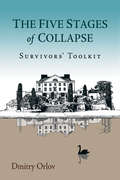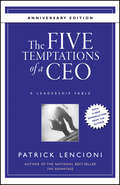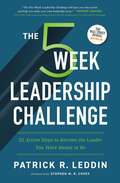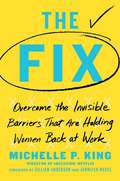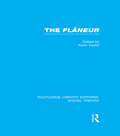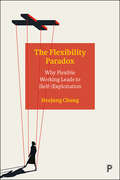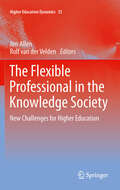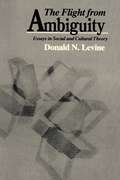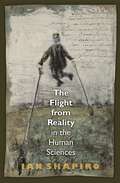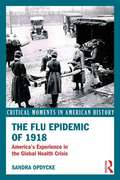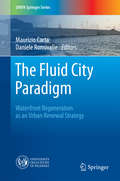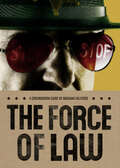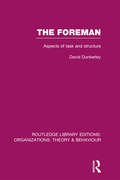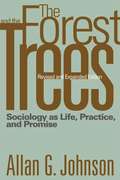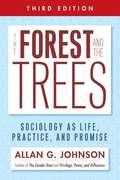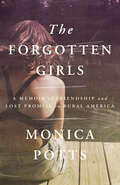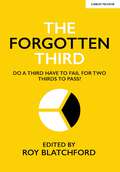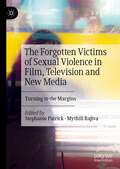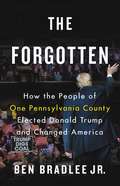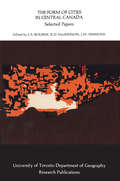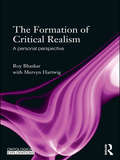- Table View
- List View
The Five Stages of Collapse
by Dmitry OrlovIn the face of political impotence, looming resource depletion, and catastrophic climate change, many of us have become reconciled to an uncertain future. However, popular perception of how this future might actually unfold varies wildly from "a severe and prolonged recession," to James Howard Kunstler's "long emergency," to the complete breakdown of civilization. In The Five Stages of Collapse, Dmitry Orlov posits a taxonomy of collapse, offering a surprisingly optimistic perspective on surviving the sweeping changes of the day with health and sanity intact.Arguing that it is during periods of disruption and extreme uncertainty that broad cultural change becomes possible, Orlov steers the reader through the challenges of financial, commercial, and political collapse. He suggests that if the first three stages are met with the appropriate responses, further breakdown may be arrested before the extremes of social and cultural collapse are reached.Drawing on a detailed examination of post-collapse societies, including the Somali people of Africa, the Pashtuns of Afghanistan, the Roma of Central and Eastern Europe, and even the Russian mafia, The Five Stages of Collapse describes successful adaptations in areas such as finance, self-governance, and social and cultural organization. These fascinating case studies provide a unique perspective on the characteristics that determine highly resilient communities. Shot through with Orlov's trademark dark humor, this is an invaluable toolkit for creating workable post-collapse solutions.Dmitry Orlov was born in Leningrad, Russia, and immigrated to the United States. He is the author of Reinventing Collapse and maintains the phenomenally popular blog Club Orlov.
The Five Temptations of a CEO, 10th Anniversary Edition: A Leadership Fable (J-b Lencioni Ser. #36)
by Patrick M. LencioniA commemorative edition of the landmark book from Patrick LencioniWhen it was published ten years ago, The Five Temptations of a CEO was like no other business book that came before. Highly sought-after management consultant Patrick Lencioni deftly told the tale of a young CEO who, facing his first annual board review, knows he is failing, but doesn't know why. Refreshingly original and utterly compelling, this razor-sharp novelette plus self-assessment (written to be read in one sitting) serves as a timeless and potent reminder that success as a leader can come down to practicing a few simple behaviors?behaviors that are painfully difficult for each of us to master. Any executive can learn how to recognize the mistakes that leaders can make and how to avoid them.The lessons of The Five Temptations of a CEO, are as relevant today as ever, and this special anniversary edition celebrates ten years of inspiration and enlightenment with a brand new introduction and reflections from Lencioni on the new challenges in business and leadership that have occurred in the past ten years.
The Five-Week Leadership Challenge: 35 Action Steps to Become the Leader You Were Meant to Be
by Patrick R. LeddinWall Street Journal BestsellerDevelop and expand your innate leadership abilities through daily exercises and challenges designed to help you grow into the leader you want to be and prepare you for the job you were made to have.A recent Harvard Business Review article outlining a study of over 17,000 leaders found that although, on average, people begin to supervise others at age 30, most do not start to receive formal leadership training until their forties.In addition to serving as a U.S. Army airborne, infantry, and ranger-qualified officer, Patrick Leddin has founded successful businesses and trained thousands of leaders. In The Five-Week Leadership Challenge, Leddin shows you how to quickly build standout leadership skills so that when the next opportunity comes along, you're the only person for the job.In this book, you will find:35 daily challenges designed to quickly develop standout leadership skills,Leadership habits you can practice regularly that get you noticed—and promoted, based on Leddin's experience training and consulting thousands of leaders all over the world,And encouragement to share your completion of the leadership challenge on social media to exponentially expand your networking opportunities, and receive bonus content and access to additional author tools.Don't wait for training that doesn't come until it's too late. The Five-Week Leadership Challenge is an invaluable guide to help any aspiring leader begin a daily practice of exercises and challenges designed to develop and grow your leadership ability as quickly as possible.
The Fix: Overcome the Invisible Barriers That Are Holding Women Back at Work
by Michelle P. KingIn the vein of #Girlboss and Nice Girls Don&’t Get the Corner Office, discover how to thrive at work from the head of the Global Innovation Coalition for Change at UN Women with this &“passionate, practical roadmap for addressing inequality and finally making our workplaces work for women&” (Arianna Huffington). For years, we&’ve been telling women that in order to succeed at work, they have to change themselves first—lean in, negotiate like a man, don&’t act too nice or you&’ll never get the corner office. But after sixteen years working with major Fortune 500 companies as a gender equality expert, Michelle King has realized one simple truth—the tired advice of fixing women doesn&’t fix anything. The truth is that workplaces are gendered; they were designed by men for men. Because of this, most organizations unconsciously carry the idea of an &“ideal worker,&” typically a straight, white man who doesn&’t have to juggle work and family commitments. Based on King&’s research and exclusive interviews with major companies and thought leaders, The Fix reveals why denying the fact that women are held back just because they are women—what she calls gender denial—is the biggest obstacle holding women back at work and outlines the hidden sexism and invisible barriers women encounter at work every day. Women who speak up are seen as pushy. Women who ask for a raise are seen as difficult. Women who spend hours networking don&’t get the same career benefits as men do. Because women don&’t look like the ideal worker and can&’t behave like the ideal worker, they are passed over for promotions, paid less, and pushed out of the workforce, not because they aren&’t good enough, but because they aren&’t men. In this fascinating and empowering book, King outlines the invisible barriers that hold women back at all stages of their careers, and provides readers with a clear set of takeaways to thrive despite the sexist workplace, as they fight for change from within. Gender equality is not about women, and it is not about men—it is about making workplaces work for everyone. Together, we can fix work, not women.
The Flaneur (Routledge Library Editions: Social Theory)
by Keith TesterTimely and original, this collection of essays from the leading figures in their fields throws new and valuable light on the significance and future of flânerie. The flâneur is usually identified as the ‘man of the crowd’ of Edgar Allen Poe and Charles Baudelaire, and as one of the heroes of Walter Benjamin’s Arcades Project. The flâneur’s activities of strolling and loitering are mentioned increasingly frequently in sociology, cultural studies and art history, but rarely is the debate developed further. The Flâneur is the first book to develop the debate beyond Baudelaire and Benjamin, and to push it in unexpected and exciting directions.
The Flexibility Paradox: Why Flexible Working Leads to (Self-)Exploitation
by Heejung ChungDoes flexible working really provide a better work-life balance? Throughout the COVID-19 pandemic, flexible working has become the norm for many workers. This volume offers an original examination of flexible working using data from 30 European countries and drawing on studies conducted in Australia, the US and India. Rather than providing a better work-life balance, the book reveals how flexible working can lead to exploitation, which manifests differently for women and men, such as more care responsibilities or increased working hours. Taking a critical stance, this book investigates the potential risks and benefits of flexible working and provides crucial policy recommendations for overcoming the negative consequences.
The Flexible Professional in the Knowledge Society
by Rolf van der Velden Jim AllenHigher education policy has increasingly gained a European dimension, with its own distinct influence over national education policies. Against this background, a major project was launched, the REFLEX project, which aims to make a contribution to assessing the demands that the modern knowledge society places on higher education graduates, and the degree to which higher education institutions in Europe are up to the task of equipping graduates with the competencies needed to meet these demands. The project also looks at how the demands, and graduates' ability to realise them, is influenced by the way in which work is organised in firms and organisations. The REFLEX project has been carried out in sixteen different countries and consisted of a large scale survey among some 70.000 graduates. This report presents the major findings and draws important policy implications.
The Flight from Ambiguity: Essays in Social and Cultural Theory
by Donald N. LevineThe essays turn about a single theme, the loss of the capacity to deal constructively with ambiguity in the modern era. Levine offers a head-on critique of the modern compulsion to flee ambiguity. He centers his analysis on the question of what responses social scientists should adopt in the face of the inexorably ambiguous character of all natural languages. In the course of his argument, Levine presents a fresh reading of works by the classic figures of modern European and American social theory—Durkheim, Freud, Simmel and Weber, and Park, Parsons, and Merton.
The Flight from Ambiguity: Essays in Social and Cultural Theory
by Donald N. LevineThe essays turn about a single theme, the loss of the capacity to deal constructively with ambiguity in the modern era. Levine offers a head-on critique of the modern compulsion to flee ambiguity. He centers his analysis on the question of what responses social scientists should adopt in the face of the inexorably ambiguous character of all natural languages. In the course of his argument, Levine presents a fresh reading of works by the classic figures of modern European and American social theory—Durkheim, Freud, Simmel and Weber, and Park, Parsons, and Merton.
The Flight from Reality in the Human Sciences
by Ian ShapiroIn this captivating yet troubling book, Ian Shapiro offers a searing indictment of many influential practices in the social sciences and humanities today. Perhaps best known for his critique of rational choice theory, Shapiro expands his purview here. In discipline after discipline, he argues, scholars have fallen prey to inward-looking myopia that results from--and perpetuates--a flight from reality. In the method-driven academic culture we inhabit, argues Shapiro, researchers too often make display and refinement of their techniques the principal scholarly activity. The result is that they lose sight of the objects of their study. Pet theories and methodological blinders lead unwelcome facts to be ignored, sometimes not even perceived. The targets of Shapiro's critique include the law and economics movement, overzealous formal and statistical modeling, various reductive theories of human behavior, misguided conceptual analysis in political theory, and the Cambridge school of intellectual history. As an alternative to all of these, Shapiro makes a compelling case for problem-driven social research, rooted in a realist philosophy of science and an antireductionist view of social explanation. In the lucid--if biting--prose for which Shapiro is renowned, he explains why this requires greater critical attention to how problems are specified than is usually undertaken. He illustrates what is at stake for the study of power, democracy, law, and ideology, as well as in normative debates over rights, justice, freedom, virtue, and community. Shapiro answers many critics of his views along the way, securing his position as one of the distinctive social and political theorists of our time.
The Flu Epidemic of 1918: America's Experience in the Global Health Crisis
by Sandra OpdyckeIn 1918, a devastating world-wide influenza epidemic hit the United States. Killing over 600,000 Americans and causing the national death rate to jump 30% in a single year, the outbreak obstructed the country's participation in World War I and imposed terrible challenges on communities across the United States. <p><p> This epidemic provides an ideal lens for understanding the history of infectious disease in the United States. The Flu Epidemic of 1918 examines the impact of the outbreak on health, medicine, government, and individual people's lives, and also explores the puzzle of Americans' decades-long silence about the experience once it was over. In a concise narrative bolstered by primary sources including newspaper articles, eye-witness accounts, and government reports, Sandra Opdycke provides undergraduates with an unforgettable introduction to the 1918 epidemic and its after-effects.
The Fluid City Paradigm
by Maurizio Carta Daniele RonsivalleThis book presents a new paradigm of knowledge and action withrespect to urban waterfronts and the "fluid city paradigm,"explaining its methodological framework and describing an integrated andcreative planning approach in which waterfront regeneration is pursued as a keyurban-renewal strategy. It focuses especially on the WATERFRONT project ("WaterAnd Territorial policiEs for integRation oF multisectoRial develOpmeNT"), whichwas funded jointly by Italy and Malta with the goal of developing commonguidelines, strategies, and operational tools for the planning of coastal areas,based on cross-border exchange of experiences. In the described approach, thewaterfront is recognized as having a broad identity, acknowledging thecomplexity of the relationship between seaport and town and taking into accountthe physical and environmental components of human settlement, infrastructure,and productive and recreational activities. It highlights details of theprocess of renewal in the port city of Trapani, with discussion of theimplemented actions, plans, and programs. The book also examines the practicesadopted to transform city-port relationships across Europe in pursuit ofinnovative and sustainable development.
The Folds of Parnassos: Land and Ethnicity in Ancient Phokis
by Jeremy McinerneyIndependent city-states (poleis) such as Athens have been viewed traditionally as the most advanced stage of state formation in ancient Greece. By contrast, this pioneering book argues that for some Greeks the ethnos, a regionally based ethnic group, and the koinon, or regional confederation, were equally valid units of social and political life and that these ethnic identities were astonishingly durable. Jeremy McInerney sets his study in Phokis, a region in central Greece dominated by Mount Parnassos that shared a border with the panhellenic sanctuary at Delphi. He explores how ecological conditions, land use, and external factors such as invasion contributed to the formation of a Phokian territory. Then, drawing on numerous interdisciplinary sources, he traces the history of the region from the Archaic age down to the Roman period. McInerney shows how shared myths, hero cults, and military alliances created an ethnic identity that held the region together over centuries, despite repeated invasions. He concludes that the Phokian koinon survived because it was founded ultimately on the tenacity of the smaller communities of Greece.
The Folklore of the Freeway: Race and Revolt in the Modernist City (A Quadrant Book)
by Eric AvilaWhen the interstate highway program connected America&’s cities, it also divided them, cutting through and destroying countless communities. Affluent and predominantly white residents fought back in a much heralded &“freeway revolt,&” saving such historic neighborhoods as Greenwich Village and New Orleans&’s French Quarter. This book tells of the other revolt, a movement of creative opposition, commemoration, and preservation staged on behalf of the mostly minority urban neighborhoods that lacked the political and economic power to resist the onslaught of highway construction.Within the context of the larger historical forces of the 1960s and 1970s, Eric Avila maps the creative strategies devised by urban communities to document and protest the damage that highways wrought. The works of Chicanas and other women of color—from the commemorative poetry of Patricia Preciado Martin and Lorna Dee Cervantes to the fiction of Helena Maria Viramontes to the underpass murals of Judy Baca—expose highway construction as not only a racist but also a sexist enterprise. In colorful paintings, East Los Angeles artists such as David Botello, Carlos Almaraz, and Frank Romero satirize, criticize, and aestheticize the structure of the freeway. Local artists paint murals on the concrete piers of a highway interchange in San Diego&’s Chicano Park. The Rondo Days Festival in St. Paul, Minnesota, and the Black Archives, History, and Research Foundation in the Overtown neighborhood of Miami preserve and celebrate the memories of historic African American communities lost to the freeway.Bringing such efforts to the fore in the story of the freeway revolt, The Folklore of the Freeway moves beyond a simplistic narrative of victimization. Losers, perhaps, in their fight against the freeway, the diverse communities at the center of the book nonetheless generate powerful cultural forces that shape our understanding of the urban landscape and influence the shifting priorities of contemporary urban policy.
The Force of Law: A Groundwork Guide (Groundwork Guides)
by Mariana ValverdeThis book examines the meaning of law from a global perspective and the many connections between law and law enforcement. An excellent introduction to the subject for young adults. Most of us in liberal democratic countries think that we live under the rule of law. Governments make the rules, we live by them and the police enforce them if we try to break them. The Force of Law critically examines these assumptions. Award-winning criminologist Mariana Valverde makes clear that while the law is usually regarded as the civilized, non-violent way to deal with harms and conflicts, violence is integral to law. After all, police are authorized to handcuff, manhandle, taser, and even kill people, and courts of law confine people to prison and, in some countries, order that they be put to death. Valverde shows that "proper" law is not always distinguishable from the rules imposed by various bodies of armed men. Worldwide, private security guards often act like police, but they serve their private clients, not the public at large. And publicly paid police officers spend much of their time managing information for other bureaucracies, instead of actually fighting crime or arresting criminals. "[The Groundwork Guides] are excellent books, mandatory for school libraries and the increasing body of young people prepared to take ownership of the situations and problems previous generations have left them." — Globe and Mail Correlates to the Common Core State Standards in English Language Arts: CCSS.ELA-LITERACY.RI.6.1 Cite textual evidence to support analysis of what the text says explicitly as well as inferences drawn from the text. CCSS.ELA-LITERACY.RI.6.2 Determine a central idea of a text and how it is conveyed through particular details; provide a summary of the text distinct from personal opinions or judgments. CCSS.ELA-LITERACY.RI.6.3 Analyze in detail how a key individual, event, or idea is introduced, illustrated, and elaborated in a text (e.g., through examples or anecdotes). CCSS.ELA-LITERACY.RI.6.6 Determine an author's point of view or purpose in a text and explain how it is conveyed in the text.
The Foreman: Aspects of Task and Structure (Routledge Library Editions: Organizations)
by David DunkerleyThe foreman is usually regarded as a filter in a chain of command in industrial organizations. In this book, however, the author suggests that this view is not adequate, and he proposes instead a model of analysis which employs a systems perspective. The role of the foreman is seen in terms of the interaction of three sub-systems representing the organization, the group and the individual. The book is based on the work of researchers from many disciplines and employs a sociological framework to account for the peculiar strains, conflict and ambiguities associated with the foreman’s role.
The Forest and the Trees: Sociology as Life, Practice, and Promise
by Allan G. JohnsonIf sociology could teach everyone just one thing, what would it be? The Forest and the Trees is one sociologist's response to the hypothetical--the core insight with the greatest potential to change how people see the world and themselves in relation to it. This revised and updated edition features: * A new chapter that brings together the various aspects of the sociological model described in previous chapters with a detailed application to the origins of racism in the United States * A discussion of how individuals can participate in social change by stepping off paths of least resistance * The addition of graphics to illustrate the sociological model of systems and individuals
The Forest and the Trees: Sociology as Life, Practice, and Promise; Third Edition
by Allan G. JohnsonIf sociology could teach everyone just one thing, what would it be? The Forest and the Trees is one sociologist's response to the hypothetical-the core insight with the greatest potential to change how people see the world and themselves in relation to it. This Third Edition features: Updated key references, data, resources, and examples, from global warming, Barack Obama's election, and gay marriage to the Occupy Wall Street Movement A glossary of terms A new framework for the short essays in Chapter 6, exhibiting the power of sociology to dig beneath easy and popular understandings An additional analysis of how men’s violence is made invisible even though most violence is perpetrated by men Chapter 7’s new focus on sociology as a worldview with an analysis of the origins of white privilege
The Forgotten Girls: A Memoir of Friendship and Lost Promise in Rural America
by Monica PottsTalented and ambitious, Monica Potts and her best friend, Darci, were both determined to make something of themselves. How did their lives turn out so different?&“The Forgotten Girls is much more than a memoir; it&’s the unflinching story of rural women trying to live in the most rugged, ultra-religious, and left-behind places in America.&”—Beth Macy, author of Dopesick Growing up gifted and working-class poor in the foothills of the Ozarks, Monica and Darci became fast friends. The girls bonded over a shared love of reading and learning, even as they navigated the challenges of their tumultuous family lives and declining town—broken marriages, alcohol abuse, and shuttered stores and factories. They pored over the giant map in their middle-school classroom, tracing their fingers over the world that awaited them, vowing to escape. In the end, Monica left Clinton for college and fulfilled her dreams, but Darci, along with many in their circle of friends, did not.Years later, working as a journalist covering poverty, Potts discovered what she already intuitively knew about the women in Arkansas: Their life expectancy had dropped steeply—the sharpest such fall in a century. This decline has been attributed to &“deaths of despair&”—suicide, alcoholism, and drug overdoses—but Potts knew their causes were too complex to identify in a sociological study. She had grown up with these women, and when she saw Darci again, she found that her childhood friend—addicted to drugs, often homeless, a single mother—was now on track to becoming a statistic.In this gripping narrative, Potts deftly pinpoints the choices that sent her and Darci on such different paths and then widens the lens to explain why those choices are so limited. The Forgotten Girls is a profound, compassionate look at a population in trouble, and a uniquely personal account of the way larger forces, such as inheritance, education, religion, and politics, shape individual lives.
The Forgotten Subject: Subject Constitutions in Mediatized Everyday Worlds
by Jeffrey Wimmer Friedrich Krotz Rainer Winter Peter GentzelThe volume provides a critical inventory of existing concepts of the subject in communication studies research. In addition, concepts are developed in order to be able to analyze subjectivity in the context of current theoretical debates (including media sociology, cultural studies, psychoanalysis, practice theory, science and technology studies) as well as social, cultural and technical developments (including digitalization, mediatization, mobility and networking). Since subject conceptions are of central importance for any communication and media analyses, the volume fills a central gap in communication and media studies.
The Forgotten Third: Do One Third Have To Fail For Two Thirds To Succeed?
by Roy Blatchford'The Forgotten Third' is a provocative collection of essays which poses the fundamental question: 'Do a third of school students have to fail so that two-thirds can pass?'Roy Blatchford has brought together a group of leading thinkers and influencers in UK education to address this question - and pose some answers.Featuring contributions from: Caroline Barlow, Geoff Barton, Rebecca Boomer-Clark, Peter Collins, Tim Coulson, Kiran Gill, Miranda Green, Peter Hyman, David Laws, Rachel Macfarlane, Rupert Moreton, Harmer Parr, Marc Rowland, Catherine Sezen, Richard Sheriff, Nic Taylor-Mullins and Iain Veitch.'The Forgotten Third' challenges orthodoxies to shape a 'levelled up' education system.
The Forgotten Victims of Sexual Violence in Film, Television and New Media: Turning to the Margins
by Stephanie Patrick Mythili RajivaThis edited collection provides an intersectional and transnational exploration of representations of sexual violence and rape within films, television shows, and digital media in the contemporary context of the #MeToo and #TimesUp movements. Drawing upon sociology, gender studies, cultural studies, media studies, and Black feminist studies, chapters focus on women and texts at the margins of mainstream culture’s depictions of sexual violence. The editors and contributors examine the dominant narrative of the thin, cisgender, heterosexual white female victim, and the ways in which social and cultural conversations around race and gender impact and are impacted by depictions of sexual violence in media. This book will be of interest to scholars and students in sociology, gender studies, and media studies, particularly those interested in the intersectionality of race and gender.Chapter 1 is available open access under a Creative Commons Attribution 4.0 International License via link.springer.com.
The Forgotten: How the People of One Pennsylvania County Elected Donald Trump and Changed America (A\book Of The Holy Roman Empire Ser.)
by Ben BradleeThe people of Luzerne County, Pennsylvania voted Democratic for decades, until Donald Trump flipped it in 2016. What happened?Named one of the "juiciest political books to come in 2018" by Entertainment Weekly.In The Forgotten, Ben Bradlee Jr. reports on how voters in Luzerne County, a pivotal county in a crucial swing state, came to feel like strangers in their own land - marginalized by flat or falling wages, rapid demographic change, and a liberal culture that mocks their faith and patriotism.Fundamentally rural and struggling with changing demographics and limited opportunity, Luzerne County can be seen as a microcosm of the nation. In The Forgotten, Trump voters speak for themselves, explaining how they felt others were 'cutting in line' and that the federal government was taking too much money from the employed and giving it to the idle. The loss of breadwinner status, and more importantly, the loss of dignity, primed them for a candidate like Donald Trump. The political facts of a divided America are stark, but the stories of the men, women and families in The Forgotten offer a kaleidoscopic and fascinating portrait of the complex on-the-ground political reality of America today.
The Form of Cities in Central Canada
by L. S. Bourne Ross D. Mackinnon James W. SimmonsDo Canadian cities have a distinctive form? How has this form evolved over time; and what has been the impact of growth, transportation changes and differing lifestyles on the contemporary Canadian urban environment? The research summarized in the present volume is directed at these kinds of questions. This book is an anthology of research papers and reports building around a common theme: urban development in Central Canada. Within this context, specific interests focus on the spatial structure of the city, land use distributions, patterns of population density and intercity migration, networks of interaction, communities, and lives. This collection of papers will be of interest as a general reference which is not just descriptive, but one which includes a range of examples of analytical approaches. As such it is also designed as a contribution to the growing literature on urban research and policy formulation in Canada.(University of Toronto Department of Geography Research Publications 12)
The Formation of Critical Realism: A Personal Perspective
by Roy Bhaskar Mervyn HartwigThis series of interviews, conducted in the form of exchanges between Roy Bhaskar and Mervyn Hartwig, tells a riveting story of the formation and development of critical realism. Three intersecting and interweaving narratives unfold in the course of this unfinished story: the personal narrative of Roy Bhaskar, born of an Indian father and English mother, a child of post-war Britain and Indian partition and independence; the intellectual narrative of the emergence and growth of critical realism; and a world-historical story, itself theorized by critical realism in its discussion of the development of modernity. This book gives an invaluable account of the development of critical realism, and its consolidation as a leading philosophy of our times. It takes us through the major moments of its formation, the principal objections to and controversies within critical realism, the establishment of its institutions, and considers its limits and future development. Special features of the book include discussion of the genesis of critical realism, and the origins and nature of the so-called dialectical and spiritual turns. The informal dialogical style of The Formation of Critical Realism makes it compelling reading and an invaluable source for students of critical realism as well as all those interested in the intellectual story of our times.
